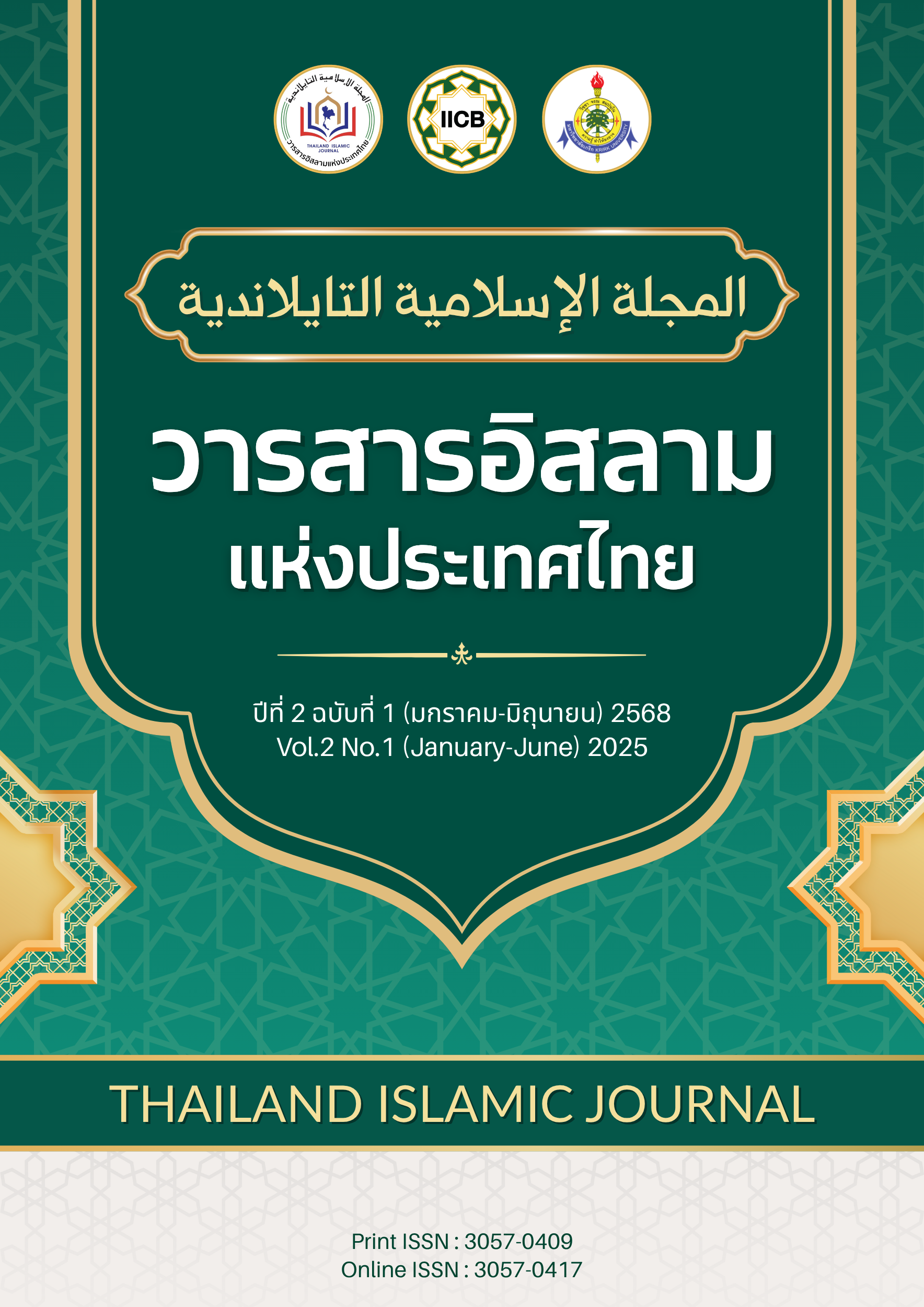Muslim-Friendly Luxury Travel in Thailand: Redefining High-Value Tourism through Cultural Sensitivity and Service Innovation
Keywords:
High-Value Tourism, Muslim-Friendly Travel (MFT), Luxury Tourism, Cultural Sensitivity, Service InnovationAbstract
Abstract
As the global Muslim travel market is projected to exceed USD 225 billion by 2028, the intersection between faith-based needs and luxury tourism experiences is gaining scholarly attention. However, limited research explores how emerging destinations, such as Thailand, can design Muslim-friendly luxury travel experiences that appeal to high-value tourists seeking both religious alignment and premium comfort. This study addresses this gap by examining how cultural sensitivity and service innovation can reshape Thailand’s tourism offerings to attract affluent Muslim travelers. Using qualitative methods, including semi-structured interviews with Muslim tourists and luxury service providers, the research identifies critical elements in delivering high-value, culturally attuned travel experiences. Findings reveal that personalized halal-certified services, inclusive space design, staff cultural competency, and value-driven storytelling are key drivers of satisfaction and loyalty in this niche market. The study introduces an integrative framework that connects Islamic hospitality principles with luxury tourism strategies, offering a roadmap for tourism stakeholders in Southeast Asia to reposition their services. This paper contributes to the literature by introducing a novel conceptualization of “Muslim-Friendly Luxury,” which merges spiritual compatibility with experiential innovation, thereby redefining what high-value tourism means in a multicultural and globalized context.
References
References
Ahmad, M. A., Musa, R., & Rosli, M. H. (2022). Service innovation and Muslim tourist satisfaction in non-Muslim destinations: The mediating role of perceived value. Journal of Islamic Marketing, 13(9), 2010–2027. https://doi.org/10.1108/JIMA-06-2021-0170
Ali, A., & Frew, E. (2023). Rethinking luxury travel through the lens of cultural sensitivity: A Muslim tourism perspective. Journal of Tourism and Cultural Change, 21(2), 145–161. https://doi.org/10.1080/14766825.2023.2170514
Ali, A., Musa, G., & Frew, E. (2023). Emotional luxury and cultural relevance: Rethinking luxury travel experiences. Tourism Recreation Research, 48(2), 178–193. https://doi.org/10.1080/02508281.2022.2047651
Battour, M., & Ismail, M. N. (2016). Halal tourism: Concepts, practices, challenges and future. Tourism Management Perspectives, 19, 150–154. https://doi.org/10.1016/j.tmp.2015.12.008
Campos, A. C., Mendes, J., do Valle, P. O., & Scott, N. (2022). Designing memorable tourism experiences through service innovation: A demand-driven approach. Journal of Travel Research, 61(5), 1108–1122. https://doi.org/10.1177/00472875211020365
Chen, H., Huang, S. S., & Choi, S. (2022). Authenticity and value co-creation in high-end tourism experiences. Journal of Travel Research, 61(6), 1285–1298. https://doi.org/10.1177/00472875211029321
CrescentRating, & Mastercard. (2023). Global Muslim Travel Index (GMTI) 2023. https://www.crescentrating.com/reports/global-muslim-travel-index-2023.html
El-Gohary, H. (2016). Halal tourism, is it really Halal? Tourism Management Perspectives, 19, 124–130. https://doi.org/10.1016/j.tmp.2015.12.013
Henderson, J. C. (2019). Responding to the needs of Muslim travelers: Case studies from Southeast Asia and beyond. Tourism Culture & Communication, 19(3), 243–255. https://doi.org/10.3727/109830419X15513764140611
Jafari, J., & Scott, N. (2014). Muslim world and its tourisms. Annals of Tourism Research, 44, 1–19. https://doi.org/10.1016/j.annals.2013.08.011
Jirattikorn, A., Maneepong, C., & Pholcharoen, S. (2023). Post-pandemic tourism policy in Thailand: Embracing high-value, low-volume tourism through the BCG economy model. Asia Pacific Journal of Tourism Research, 28(4), 412–428. https://doi.org/10.1080/10941665.2023.2196821
Kamarulzaman, N. H., Salleh, N. Z. M., & Zainal, A. (2020). Muslim-friendly tourism innovation in Thailand: Gaps and potential. International Journal of Tourism Cities, 6(2), 423–440. https://doi.org/10.1108/IJTC-10-2019-0170
Kim, J. H., & Thapa, B. (2021). Sustainable luxury tourism: Exploring values and experiences of affluent tourists. Journal of Destination Marketing & Management, 20, 100616. https://doi.org/10.1016/j.jdmm.2021.100616
Lu, V. N., Berens, S., & Harrigan, P. (2020). Emotional engagement and service innovation in luxury tourism. Journal of Business Research, 116, 530–539. https://doi.org/10.1016/j.jbusres.2019.08.031
Marinova, D., de Ruyter, K., Huang, M. H., Meuter, M. L., & Challagalla, G. (2021). Getting smart: Learning from service robots in hospitality. Journal of Service Research, 24(2), 238–258. https://doi.org/10.1177/1094670520923648
Musa, G., & Chou, D. (2021). Muslim-friendly hospitality in non-Muslim countries: Cultural competency as competitive advantage. International Journal of Contemporary Hospitality Management, 33(5), 1854–1873. https://doi.org/10.1108/IJCHM-02-2020-0149
Neuhofer, B., Buhalis, D., & Ladkin, A. (2020). Smart service design for experiential luxury: A consumer-centered perspective. Journal of Service Management, 31(3), 417–437. https://doi.org/10.1108/JOSM-05-2019-0155
Pine, B. J., & Gilmore, J. H. (2019). The experience economy: Competing for customer time, attention, and money (Updated ed.). Harvard Business Review Press.
Reisinger, Y., & Turner, L. (2021). Cross-cultural behaviour in tourism: Concepts and analysis (2nd ed.). Routledge.
Samori, Z., & Abd Rahman, F. (2021). The evolution of Muslim-friendly tourism: From obligation to lifestyle experience. Journal of Islamic Tourism Research, 6(1), 1–15.
Sharif, S., & Alipour, H. (2023). Cultural misalignment in tourism services: A review of challenges and responses. Journal of Destination Marketing & Management, 29, 100755. https://doi.org/10.1016/j.jdmm.2023.100755
Sirisamphan, P., & Presbury, R. (2021). Service quality perceptions of international tourists in Thailand: The role of cultural sensitivity. Asia Pacific Journal of Tourism Research, 26(10), 1131–1144. https://doi.org/10.1080/10941665.2021.1953729
Smith, M. K., & Puczkó, L. (2022). Health, tourism and hospitality: Spas, wellness and medical travel (3rd ed.). Routledge.
Stephenson, M. L. (2014). Deciphering ‘Islamic hospitality’: Developments, challenges and opportunities. Tourism Management, 40, 155–164. https://doi.org/10.1016/j.tourman.2013.05.002
Stephenson, M. L. (2019). Development and management of Islamic tourism in non-Muslim countries: The concept of Muslim-friendly hospitality. Tourism Management Perspectives, 31, 100626. https://doi.org/10.1016/j.tmp.2019.100626
Snyder, H., Witell, L., Gustafsson, A., Fombelle, P., & Kristensson, P. (2023). Identifying categories of service innovation: A review and synthesis of the literature. Journal of Business Research, 157, 113604. https://doi.org/10.1016/j.jbusres.2022.113604
TAT Intelligence Center. (2022). Thailand Tourism Direction 2022–2027. Tourism Authority of Thailand.
Tung, V. W. S., Chen, P. J., & Wang, Y. (2021). Redefining luxury tourism: A grounded theory approach. Tourism Management, 83, 104208. https://doi.org/10.1016/j.tourman.2020.104208
UNWTO. (2023). Tourism for sustainable development: Building inclusive and high-value models. United Nations World Tourism Organization.
Vargo, S. L., & Lusch, R. F. (2016). Institutions and axioms: An extension and update of service-dominant logic. Journal of the Academy of Marketing Science, 44, 5–23. https://doi.org/10.1007/s11747-015-0456-3
Wong, F. Y., & Musa, G. (2020). The effects of luxury service elements on tourist loyalty: Evidence from upscale resorts in Southeast Asia. Tourism Management Perspectives, 33, 100624. https://doi.org/10.1016/j.tmp.2019.100624
World Bank. (2021). Thailand economic monitor: The road to recovery and high-value tourism. https://www.worldbank.org/thailand-tourism-monitor
Yeoman, I., & McMahon-Beattie, U. (2023). The future of luxury tourism: Drivers, trends and strategies. Journal of Tourism Futures, 9(1), 1–14. https://doi.org/10.1108/JTF-03-2022-0064
Zainuddin, N. H., Yahaya, M. F., & Rashid, S. N. S. A. (2022). Enhancing Muslim tourist experiences through culturally responsive services. Journal of Islamic Marketing, 13(10), 2053–2071. https://doi.org/10.1108/JIMA-05-2021-0123
Downloads
Published
How to Cite
Issue
Section
License
Copyright (c) 2025 Internatinal Islamic College Bangkok, Krirk University

This work is licensed under a Creative Commons Attribution-NonCommercial-NoDerivatives 4.0 International License.
วารสารที่ได้รับการตีพิมพ์เป็นลิขสิทธ์ของวิทยาลัยนานาชาติอิสลามกรุงเทพ มหาวิทยาลัยเกริก
ข้อความที่ปรากฎในบทความแต่ละเรื่องในวารสารวิชาการเล่มนี้เป็นความคิดเห็นส่วนตัวของผู้เขียนแต่ละท่านไม่เกี่ยวข้องกับวิทยาลัยนานาชาติอิสลามกรุงเทพ และคณาจารย์ท่านอื่น แต่อย่างใด ความรับผิดชอบองค์ประกอบทั้งหมดของบทความแต่ละเรื่องเป็นของผู้เขียน




